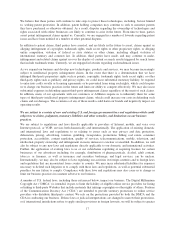Yahoo 2010 Annual Report Download - page 26
Download and view the complete annual report
Please find page 26 of the 2010 Yahoo annual report below. You can navigate through the pages in the report by either clicking on the pages listed below, or by using the keyword search tool below to find specific information within the annual report.We are subject to both U.S. and foreign laws and regulations. Violations of these complex laws and regulations
that apply to our international operations could result in damage awards, fines, criminal actions or sanctions
against us, our officers or our employees, prohibitions on the conduct of our business and damage to our
reputation. Although we have implemented policies and procedures designed to promote compliance with these
laws, there can be no assurance that our employees, contractors or agents will not violate our policies. These
risks inherent in our international operations and expansion increase our costs of doing business internationally
and could result in harm to our business, operating results, and financial condition.
New technologies could block display advertisements or search advertisements, which could harm our
operating results.
Technologies have been developed and are likely to continue to be developed that can block display or search
advertisements. Most of our revenue is derived from fees paid by advertisers in connection with the display of
graphical advertisements or clicks on search advertisements on Web pages. As a result, advertisement-blocking
technology could reduce the number of display and search advertisements that we are able to deliver and, in turn,
could reduce our advertising revenue and operating results.
Proprietary document formats may limit the effectiveness of our search technology by preventing our
technology from accessing the content of documents in such formats, which could limit the effectiveness of
our products and services.
A large amount of information on the Internet is provided in proprietary document formats. These proprietary
document formats may limit the effectiveness of search technology by preventing the technology from accessing
the content of such documents. The providers of the software applications used to create these documents could
engineer the document format to prevent or interfere with the process of indexing the document contents with
search technology. This would mean that the document contents would not be included in search results even if
the contents were directly relevant to a search. The software providers may also seek to require us to pay them
royalties in exchange for giving us the ability to search documents in their format. If the search platform
technology we employ is unable to index proprietary format Web documents as effectively as our competitors’
technology, usage of our search services might decline, which could cause our revenue to fall.
Interruptions, delays, or failures in the provision of our services could harm our operating results.
Delays or disruptions to our service could result from a variety of causes, including the following:
• Our operations are susceptible to outages and interruptions due to fire, flood, earthquake, power loss,
telecommunications failures, cyber attacks, terrorist attacks, and similar events.
• The systems through which we provide our products and services are highly technical, complex, and
interdependent. Design errors might exist in these systems, or might be introduced as we roll out
improvements and upgrades, which might cause service malfunctions or require services to be taken offline
while corrective responses are developed.
• Despite our implementation of network security measures, our servers are vulnerable to computer viruses,
worms, physical and electronic break-ins, sabotage, and similar disruptions from unauthorized access and
tampering, as well as coordinated denial-of-service attacks. We are distributing servers among additional data
centers around the world to create redundancies; however, we do not have multiple site capacity for all of our
services and some of our systems are not fully redundant in the event of delays or disruptions to service.
• We rely on third-party providers for our principal Internet connections and co-location of a significant portion
of our data servers, as well as for our payment processing capabilities and key components or features of our
search, e-mail and VOIP services, news, stock quote and other content delivery, chat services, mapping,
streaming, geo-targeting, music, games, and other services. We have little or no control over these third-party
providers. Any disruption of the services they provide us or any failure of these third-party providers to handle
higher volumes of use could, in turn, cause delays or disruptions in our services and loss of revenue. In
addition, if our agreements with these third-party providers are terminated for any reason, we might not have a
readily available alternative.
24
























